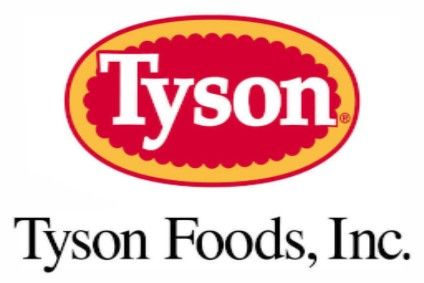
Tyson Foods, the US meat giant, faces questions over the company’s record on five environmental, social and governance issues, including animal welfare, its use of water and growing demand for plant-based foods.
The US-based Interfaith Center on Corporate Responsibility, which comprises 300 organisations that see their investments in businesses as “a catalyst for social change”, yesterday (24 August) announced the filing of five shareholder resolutions for Tyson’s 2017 proxy ballot.

Discover B2B Marketing That Performs
Combine business intelligence and editorial excellence to reach engaged professionals across 36 leading media platforms.
The ICCR said the move reflected Tyson’s “poor performance on environmental, social and governance (ESG) issues”. It claimed its members believe the response from Tyson’s management on the issues has been “poor”.
Nadira Narine, programme director at the ICCR, said: “The risks presented in these resolutions are significant and impact a broad group of stakeholders. Shareholders want the companies they invest in to use their influence to minimise environmental and social risk, and to have adequate corporate governance mechanisms in place. Our members continue to call on Tyson to authentically engage its shareholders and other stakeholders to proactively address these important issues.”
On water, the ICCR has urged Tyson to put in place a new “water stewardship policy” to reduce the risks of water contamination at the company’s own plants, facilities under contract to Tyson and the company’s suppliers. It pointed to a report by lobby group Environment America, which claimed Tyson discharged over 20 million pounds of permitted toxic pollutants to waterways in 2014.
On animal welfare, a resolution put forward by the Humane Society of the United States asks Tyson to “disclose the risks endangering the company and investors from emerging animal welfare issues” and the steps the company has in place to address them.

US Tariffs are shifting - will you react or anticipate?
Don’t let policy changes catch you off guard. Stay proactive with real-time data and expert analysis.
By GlobalDataGreen Century Capital Management, a group of what claims to be environmentally-responsible mutual funds, has issued a resolution seeks to find out what steps Tyson will take “to address risks to the business from the increased prevalence of plant-based eating”.
Marissa LaFave, a shareholder advocate at Green Century, said: “The demand for plant-based proteins is skyrocketing, and needs to be considered and accounted for in business planning. Failure to see around corners and adjust to changing demands places the company at a great disadvantage relative to its competitors in the food industry who are already innovating in this area.”
The other two of the five resolutions focus on board diversity and lobbying disclosure. Oxfam campaigner Oliver Gottfried said: “Given that nearly two-thirds of Tyson’s workforce is comprised of people of color, yet only one person of color sits on their board, we believe the company needs to do a better job of more intentionally promoting diversity.”
Tyson had not responded to a request for comment at the time of publication. The company’s shareholders meeting is likely to take place in early 2017.
In March, Tyson released a wide-ranging sustainability report, in which, for example, the company outlined its “commitment to animal well-being”. It also said it would start reporting its “water management and performance efforts” to environment NGO the the CDP in 2016.





